#Falsifiability
Explore tagged Tumblr posts
Text

"I see science in general as a form of arrogance control, in the sense that it's one of the most organized methods we have of forcing us to put our beliefs to the test, and forcing us to face dissonance if the test does not confirm what we believe."
-- Carol Tavris
41 notes
·
View notes
Text
False Consciousness is what makes Marxism a godless religion:
And a far less efficient godless religion than Confucianism, which was the core of one of the most successful systems in the history of systems for 2,000 years. It allows the Marxist to always be right, to never be in error, and to never have to account for the many, many ways the writing of a Prussian Lutheran in the 1840s Rhineland and Dickens's London doesn't work in an age of nuclear weapons, computers, and satellites that can see houses from space.
If an idea cannot be falsified then it operates on the premise of a religion and should be treated as such.
#falsifiability#false consciousness#aka why Karl Marx was a dollar store false prophet#who conned a lot of people who hated various traditional religions into a NRM#understanding this is the key to understanding the dynamics of communism from the 19th Century to the present#it's more of a religion than a political movement#in this sense its only real mirror is fascism which is a straight up BLOOD FOR THE BLOOD GOD death cult
3 notes
·
View notes
Text
I went looking for ways to medically distinguish scrupulosity and touch starvation from a sense of shame and frotteurism, and found nothing in the literature clearer than a typical newspaper horoscope.
It's almost as if both "conditions" are mentioned in medical literature despite not being falsifiable.
1 note
·
View note
Text
youtube
TODAY IN PHILOSOPHY OF HISTORY
Karl Popper on Historicism and Indeterminism
Sunday 28 July 2024 is the 122nd anniversary of the birth of Karl Popper (28 July 1902 - 17 September 1994), who was born in Vienna on this date in 1902.
Popper’s philosophy of history, expressed his The Open Society and Its Enemies in 1945 and The Poverty of Historicisim in 1957, can be understood as an application of his conception of knowledge, worked out in his philosophy of science, to history and the social sciences, which he equates as both being illicitly involved in a project of attempting to make historical predictions. Denying the possibility of prediction in history, Popper argued again historical determinism and inevitability.
Quora: https://philosophyofhistory.quora.com/
Discord: https://discord.gg/r3dudQvGxD
Links: https://jnnielsen.carrd.co/
Newsletter: http://eepurl.com/dMh0_-/
Text post: https://geopolicraticus.substack.com/p/karl-popper-on-historicism-and-determinism
Video: https://youtu.be/HVn-FpY27F4
Podcast: https://spotifyanchor-web.app.link/e/3zgCnoD2ALb
#philosophy of history#youtube#Karl Popper#determinism#indeterminism#prediction#philosophy of science#falsifiability#historicism#Youtube
1 note
·
View note
Text
Except Gender Theory has no biological basis, so you are talking about the equivalent of opening up the North Korean textbooks to prove Kim is a living god. Gender is, at best, a psychological construct, at worst an outright fraud, but the book says BIOLOGY. There's not one page of a biology textbook that should be discussing non-biological topics. You can decide that your Gender is the three thousandth digit of pi set in stone on a blazing asphalt field in the Antarctic. Since it has no objective reality, AND IS NOT SUBJECT TO THE SCIENTIFIC METHOD, it cannot be disproven. But equally, it has nothing to do with biology. So read a book on biology that wasn't written by a Leftist. And yes, the Leftists wrote the texts for the last few years. That doesn't somehow invalidate the validity of human knowledge. What sex are you? If your belief doesn't match the biological reality, you are experiencing a delusion. Believing you are Napoleon doesn't make you Napoleon. Finding books by people who also believe they are Napoleon doesn't make you Napoleon.
You are mentally ill, and you are in a cult that is making you sicker, and looking at the suicide rates of your cult members, I advise you to get help from outside the cult.

537 notes
·
View notes
Text
Demarcating Science: Criteria for Distinguishing Science from Pseudoscience
The demarcation problem, which is the challenge of distinguishing science from pseudoscience or non-science, has been a topic of debate among philosophers of science for many years. There is no one-size-fits-all solution to this problem, but several proposed criteria and approaches have been suggested over time. Here are some potential solutions and criteria for addressing the demarcation problem:
Falsifiability (Karl Popper): According to Karl Popper, a scientific theory should be considered scientific if it is falsifiable. This means that for a theory to be scientific, there must be a way to test it empirically, and in principle, it should be possible to find evidence that could potentially refute or falsify the theory. If a theory is not falsifiable, it falls outside the realm of science.
Empirical Evidence: Another criterion for demarcating science from pseudoscience is the reliance on empirical evidence. Scientific claims should be based on empirical observations, experimentation, and data. If a purported scientific theory lacks empirical support and relies primarily on anecdotal evidence or testimonials, it may be considered pseudoscientific.
Predictive Power: Scientific theories often have predictive power. They can make testable predictions about future observations or experiments. The ability of a theory to make accurate and successful predictions can be seen as a hallmark of scientific validity.
Methodological Rigor: Science typically adheres to well-established and rigorous methods of inquiry, including the scientific method. The presence of systematic and well-documented research methods, peer review processes, and a commitment to critical evaluation can help distinguish science from non-science.
Progressive Research Program (Imre Lakatos): Imre Lakatos proposed a demarcation criterion based on research programs. He argued that scientific research programs should be judged by their ability to generate novel research questions and solutions. A scientific program that continually generates new questions and adapts to new evidence is considered progressive.
Consensus and Peer Review: Consensus among scientists and peer review processes can be used as indicators of scientific validity. Scientific claims that have withstood scrutiny, debate, and rigorous evaluation by experts in the field are more likely to be considered scientific.
Naturalism: Some philosophers argue for naturalism as a criterion, suggesting that scientific theories should be rooted in natural causes and explanations. Any theories invoking supernatural or unobservable entities may be considered pseudoscientific.
Historical Precedent: Examining historical cases of scientific advancement and the criteria used by scientists in the past to distinguish science from pseudoscience can provide insights into demarcation.
It's important to note that these criteria are not always clear-cut, and there may be gray areas where it is challenging to make definitive judgments. Additionally, some philosophers argue that the demarcation problem may not have a single, universal solution and that it may vary depending on the context and the specific scientific discipline under consideration. As a result, the demarcation problem remains a subject of ongoing debate and discussion in the philosophy of science.
#philosophy#ontology#epistemology#metaphysics#knowledge#learning#education#chatgpt#Demarcation Problem#Karl Popper#Philosophy of Science#Scientific Method#Falsifiability#Empirical Evidence#Predictive Power#Methodological Rigor#Imre Lakatos#Peer Review#Naturalism in Science#Philosophy of Scientific Inquiry#Pseudoscience#Scientific Criteria#Progress in Science
0 notes
Text
The New York Times is a fucking joke of a paper. Recently I literally cannot look at a headline without feeling utterly hopeless at the state of the world… because of the state of journalism. It’s honestly heinous, and quite frankly terrifying.
“Israeli Rabbi who Disappeared is Found Dead”
No. Try, “Rabbi was KIDNAPPED and MURDERED in the UAE by TERRORISTS.”
It’s genuinely not controversial to tell the truth. He did not “disappear” — he was kidnapped. By terrorists. He was not “found dead” — he was fucking murdered for being a Jew. Call it like it is or don’t call it at all.
Genuinely insane and disgusting that the nyt can claim to have journalistic integrity after this past year. When it comes to anything Jewish or Israeli, this isn’t an outlier of a headline; it’s the fucking rule.
#may his memory be a blessing#idk why this is what sent me over the edge#but i’m fucking over it#how can you call yourself a reporter if you REFUSE to actually report??????#it’s genuinely mind boggling#fuck the nyt#jumblr#jewish#antisemitism#nyt#it’s always misleading or straight up falsifying the situation when it comes to jews#and if you aren’t jewish you would never know#that’s the scary part#and people wonder why everyone thinks antisemitism is just anti zionism#because it’s like this.#subtle#not outright hate speech#but contributing to bias in an academically and socially acceptable way
303 notes
·
View notes
Text
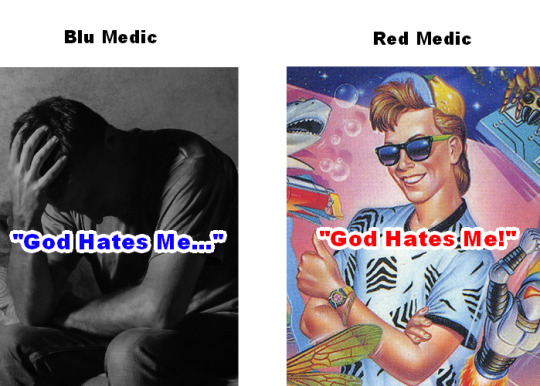
a meme specific to my interpretations
#gopher rambles#tf2 medic#shitpost#team fortress 2#tf2 memes#emesis blue#my interpretation of blu team is just as clones with falsified memories that have altered their personalities#all of them are less volatile than their red counterparts but are a less effective team#this is especially noticable with Blu Medic (Friedrich) who is basically just emesis blue medic because I think it's funny#so basically this is Catholic Guilt Medic vs Agnostic God Hater Medic. Red Medic (Ludwig) believes that if god is real they're mutual hater
516 notes
·
View notes
Text






↠ Tim & Lucy ↳ 2x01 - Impact
#jesuis-assez edits: chenford#jesuis-assez edits: chenford scenes 2x01#🤣Love it. Look at him staring her down.#Sir... That's your future wife.#2x01 hits different now that we have some more insight into Tim's past.#To see him so pressed here because she didn't report him.#He's seeing himself in her choice to not report him. His past self.#He's got the emotional walls back up and she's only going to tear them down again.#Darting his eyes back and forth with hers and that .. JAW CLENCH ����I love those jaw clenches. Is this affecting you Tim? 🤭#In more ways than one. Her being kind to him in light of him knowing this#Catapulting his mind back to the person 'he used to be' and how hard he has tried to shake that choice he made all those years ago.#How hard he has tried to redeem all of that for it to come crashing back in the form of his rookie who was trying to protect him.#Because she's supposed to be different from him. She's supposed to be better. And he's mad at her for making the same choice.#But he's also mad at himself. Because he's supposed to be better and he's supposed to be different now.#Even though he isn't all that different. He was falsifying reports to protect Isabel.#He's supposed to be training her to be better and she made the same choice he made.#So his course of action is to rev up the training some more. Maybe he was too soft and lenient with her towards the end of s1#and he lost sight of his training methods and how rules matter.#but he also lowered his walls and was vulnerable with her. He let her in.#And he's going to keep letting her in despite how much he tries to resist.#with every act of kindness she shows him... the walls break down and soften a little#until all that remains is Tim's unwavering tenderness for Lucy.#that only seems to grow more in her presence and influence.
101 notes
·
View notes
Text
By: Michael Shermer
Published: Jun 21, 2024
In my book Why People Believe Weird Things I offered this definition of how science works:
Science is a set of methods designed to describe and interpret observed or inferred phenomenon, past or present, aimed at building a testable body of knowledge open to rejection or confirmation
That is, science is something we do, an action, a verb, to describe what we see in the lab or field or world, or interpret what we think we see, since the facts never just speak for themselves but must be interrupted through some model or theory (facts are “theory laden”). Sometimes we see things directly, but sometimes we must infer their presence indirectly, for example, exo-planets are inferred by their effects on their home star, either by the perturbation of the star’s motion or by the amount of emitted light that dims when the planet passes in front of it that astronomers can detect. Because many sciences are historical in nature—cosmology, geology, paleontology, archaeology, and history—we have to infer information about them from indirect sources. To put this mouthful more briefly:
Science is a method to explain the world that is testable and open to change.
My favorite rendition of this process comes from a 1964 lecture at Cornell University by the Nobel laureate physicist Richard Feynman:
If it disagrees with experiment, it’s wrong. In that simple statement is the key to science. It doesn’t make any difference how beautiful your guess is, how smart you are, who made the guess, or what his name is. If it disagrees with experiment, it’s wrong. That’s all there is to it.
Is that all there is to it? In this week’s Skeptic column a scholar of Karl Popper, Eric Denton, considers this question, in the context of what happens when people do not understand how science works, as evidenced by Tucker Carlson’s recent appearance on Joe Rogan when he revealed his ignorance about the theory of evolution.
—Michael Shermer
Eric Denton is a writer and podcaster whose primary focus is epistemology; in particular, Popperian epistemology. He separates the wheat from the chaff by subjecting popular science and philosophical writings to severe criticism. His mission is to promulgate critical rationalism to his readers and listeners. Eric is currently working on a book which revolves around the work of Sir Karl Popper.
--
By: Eric Denton
Tucker Carlson, Karl Popper, and How Science Really Works
Eric Denton
“Theories (scientific or otherwise) are trials, inventions; they are not the results of many observations; they are not derived from many data.”
—Karl Popper, All Life Is Problem Solving
On the April 23, 2024 episode of the wildly popular podcast The Joe Rogan Experience, former preppy now turned populist right-wing firebrand Tucker Carlson confidently declared that “the theory of evolution as articulated by Darwin is like, kinda not true.”
“In what sense?” asked a bemused Joe Rogan.
“Well, in the most basic sense,” Carlson continued. “The idea that—you know—all life emerged from a single organism and overtime—and—there would be a fossil record of that and there’s not.”
Rogan interjected by mentioning the existence of transitional fossils; fossils exhibiting adaptations to particular environments.
Carlson quickly appropriated this explanation for his own ends: “there’s tons of record of adaptation and you see it, in your own life. I mean, I have a lot of dogs—I see adaptation in dogs….” He rambled on a bit more before concluding, “but no, there’s no evidence at all that—none—zero—that, you know, people, you know, evolved seamlessly from a single cell amoeba; no, there’s not—there’s not—there’s no chain in the fossil record of that at all.”

I’m afraid Carlson’s blathering is demonstrative of how a great many people think about the methods of science and the growth of knowledge. Like him, multitudes think we acquire knowledge through our senses. This is false. But before continuing, let me supplement this claim with a quote from the philosopher of science Karl Popper’s book The Logic of Scientific Discovery, “I readily admit that only observation can give us ‘knowledge concerning facts’, [here Popper is quoting philosopher Hans Hahn] and that we can ‘become aware of facts only by observation’.” But then Popper reflects, “but this awareness, this knowledge of ours, does not justify or establish the truth of any statement.” So, to be sure, we can learn facts using our senses—unjustified tentative facts—but this isn’t where knowledge comes from.
On November 24, 1859, Charles Darwin introduced what philosopher Daniel Dennett would later call the “best idea anyone has ever had.” This idea was the theory of evolution by natural selection. “In a single stroke,” Dennett asserts in his book Darwin’s Dangerous Idea, “the idea of evolution by natural selection unifies the realm of life, meaning, and purpose with the realm of space and time, cause and effect, mechanism and physical law.” The evolutionary biologist Richard Dawkins waxes eloquent about the simplicity and elegance of natural selection in his book The Blind Watchmaker, following up with a curious question, “how could such a simple idea go so long undiscovered by thinkers of the caliber of Newton, Galileo, Descartes, Leibnitz, Hume and Aristotle?” I’ve often asked this myself.
A couple of centuries before Darwin, in 1610, Galileo Galilei observed, among other things, the phases of Venus (shadows caused by its relation to the sun) through his newly improved homemade telescope, thereby corroborating the heliocentric theory of our solar system; a theory put forth by Nicolaus Copernicus about a half century earlier. With this discovery—in the minds of many—we had finally found the key to making scientific progress: observation! It seemed as if Galileo had simply pointed his telescope at Venus, observed it circling the sun, and voilà, the truth was revealed. But is this what really happened? I’ll argue below that this is mistaken. But first we need context.
About a decade after the corroboration of the heliocentric theory, the philosopher Francis Bacon independently put forth a scientific method that vaguely resembled what Galileo had done. Or at least it seemed so under indiscriminate viewing. His method proposed that, in order to make scientific progress, we must derive general theories from specific observations. For example, if—up to now—you’ve only ever come across white swans in your life, according to Bacon’s method you can logically deduce that all swans are white; you notice a pattern, then derive a theory. “We must not imagine or invent,” Bacon writes in his book Novum Organum, “but discover….”

[ The title page illustration of Francis Bacon’s Novum Organum ]
In other words, we simply allow knowledge to enter our brains through our senses. Sound familiar? This is precisely how Tucker Carlson demonstrated his method of understanding the natural world. “I see adaptation in dogs,” he said. From this he forms the theory that adaptation is “clearly, obviously true,” but then says “there’s no evidence at all that… people… evolved seamlessly from a single cell amoeba.” Notice that he easily accepts adaptation (which, ironically, is a result of natural selection), but refuses to accept the full theory; all this because he didn’t see it happen.
Before returning to Italy with Galileo, let’s first revisit this statement by Bacon. Here it is in full:
We must not imagine or invent, but discover the acts and properties of nature.
This statement is somewhat paradoxical because it does indeed take us two steps forward, but it also takes us one step back. Two steps forward because it abandons traditional authorities (which is a good thing); one step back because it sets up a new authority, namely, our senses. Wait, our senses can be an authority? No, but that’s what they became under many early thinkers. This kind of reasoning is what legitimized the flat earth theory for so long. For example, if you had a time machine and traveled back in time to the 14th century and asked any number of people why they thought the earth was flat, perplexed, they would answer with their own question: “does it look curved?”
Quick but critical digression: the “white swan” proposition mentioned above comes from the 19th century philosopher John Stuart Mill in his book A System of Logic. In it, Mill points out the major flaw in the Baconian method; the fact that it will never be able to give us certainty:
To Europeans, not many years ago, the proposition, all swans are white, appeared an equally unequivocal instance of uniformity in the course of nature. Further experience has proved to both that they were mistaken; but they had to wait fifty centuries for this experience. During that long time, mankind believed in a uniformity of the course of nature where no such uniformity really existed.
This is an extremely important finding in the study of knowledge. It was first noticed by the Ancient Greek skeptical philosophers but took nearly two thousand more years before being neatly articulated by the Scottish philosopher David Hume in his book A Treatise of Human Nature. “We suppose, but are never able to prove, that there must be a resemblance betwixt those objects, of which we have had experience, and those which lie beyond the reach of our discovery.” No matter how many white swans you may come across in your life, there’s always the possibility that a black swan might be sitting on an undiscovered island in the middle of the ocean.
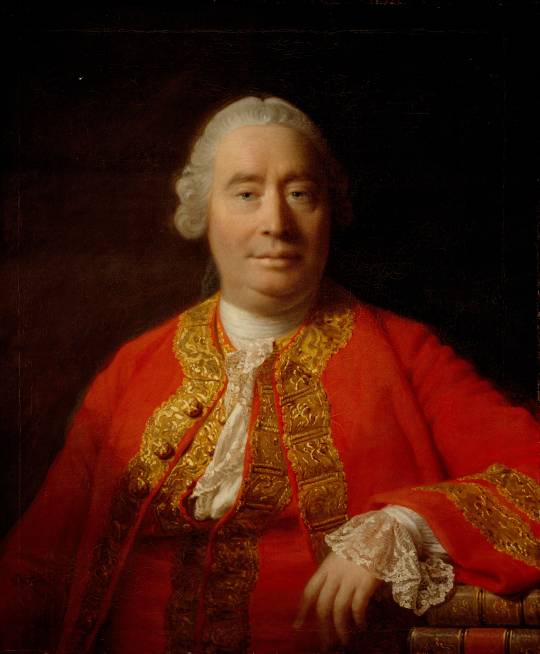
[ David Hume by Allan Ramsay, 1766 ]
Now that we have some context surrounding our “senses as an authority” problem, let’s reexamine Galileo and his Venus observations. In his book, Galileo: Watcher of the Skies, historian David Wootton describes a letter Johannes Kepler received from Galileo in 1597 in which “he made a most remarkable claim.” After revealing he had been a Copernican for quite a while, Galileo writes of the heliocentric theory, “with this hypothesis [I] have been able to explain many natural phenomena, which under the current hypothesis remain unexplainable.” This conflict of theories was a problem, but as Karl Popper writes, “the natural as well as the social sciences always start from problems…” He continues, “seeing a new problem may well be the most difficult step in creating a new theory.” I take this as Popper indicating how much of a gift finding a problem truly is. When we find a problem we should cherish it. From the same book, All Life Is Problem Solving, Popper outlines the growth of knowledge as follows:
The starting point is always a problem or a problem situation.
Attempted solutions then follow. These consist of theories, and these theories, being trials, are very often wrong: they are and always will be hypotheses or conjectures.
In science, too, we learn by eliminating our mistakes, by eliminating our false theories.
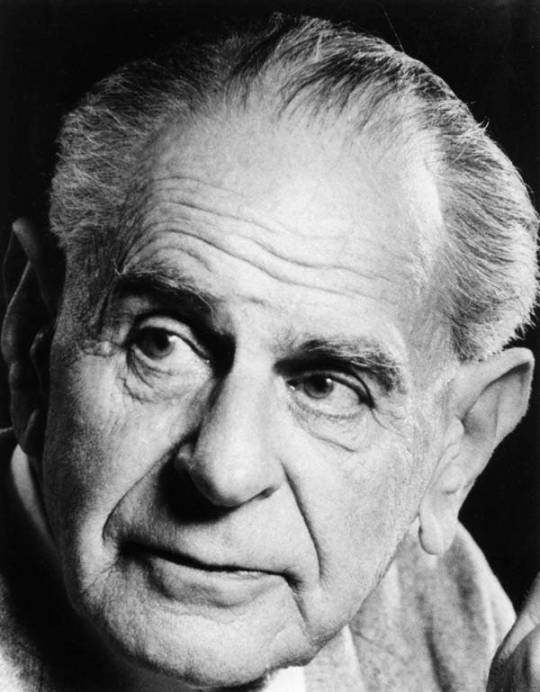
[ Sir Karl Popper in the 1980s. ]
In short, all knowledge creation is through trial and error. More specifically, trial and the elimination of error, always with the understanding that we can never be certain that we’ve landed on the truth. We proceed not with certain knowledge, but with good explanations. What are those? Here, the theoretical physicist David Deutsch provides a helpful addendum to Popper’s work with a definition from his book The Beginning of Infinity: a good explanation is “an explanation that is hard to vary while still accounting for what it purports to account for.” Put differently, “God did it” is a bad explanation because it can be used to describe anything.
Given this, what really happened with Galileo and his telescope? As previously noted, he started with a problem; a conflict between two theories. Notice that Galileo already had a theory in mind before he made his observation:; the Copernican theory. This will always be the case. “There is no such thing as ‘raw’ experience,” writes Deutsch; “all our experience of the world comes through layers of conscious and unconscious interpretation.” Or as Popper is supposed to have said, “all observation is theory-laden.”
The predominant theory of Galileo’s time was geocentrism, put forth by the 2nd century astronomer Claudius Ptolemy, asserting that the Sun, the Moon, and the stars all circle the earth. Ptolemy’s was a complex model involving different epicycles. He came to this mistaken hypothesis by the false authority of his senses—by looking at the movement of the heavens and attempting to describe what he saw. Galileo on the other hand observed Venus (a wondering dot in the sky conjectured to be a planet) with having both the Ptolemaic and the Copernican theories in mind. Long story short, the Copernican theory simply made more sense than the common-sense theory put forth by Ptolemy. But as Deutsch notes in The Fabric of Reality, “our best theories are not only truer than common sense, they make more sense than common sense.” Common sense is just another way of describing the Baconian method.
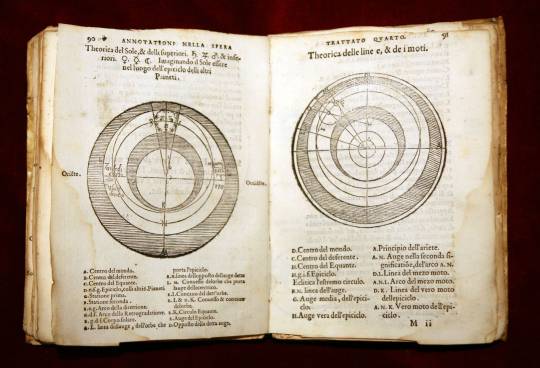
[ Pages from 1550 Annotazione on Sacrobosco's De sphaera mundi, showing the Ptolemaic system. ]
This brings us back to Darwin. How did he come up with the theory of evolution by natural selection? He did exactly what Bacon said not to do, he imagined and invented! As with the creation of all knowledge, he didn’t start with an observation, but with a problem. What was his problem? It was the “mystery of mysteries,” as he describes it in the Origin, alluding to a phrase first uttered by the naturalist John Herschel, who was referring to precisely the same problem: what is the origin of species? The prevailing theory in Darwin’s day was standard biblical creationism, bracketed by Plato’s essentialism. Darwin himself held this view before encountering a conflict between his theory and his observation. The evolutionary biologist Ernst Mayr describes this conflict in his introduction to Origin’s facsimile:
Three sets of observations, in particular, impressed Darwin: that fossils from South America are related to the living fauna of that continent rather than to contemporaneous fossils from everywhere; that the faunas of the different climatic zones of South America are related to each other, rather than to animals of the same climatic zone on different continents; and, most important, that the faunas of islands (Falkland, Galapagos) are related to those of the nearest mainland and that related species occur on different islands of the same archipelago.
When one is faced with a situation like this—a problem situation—one has to start making guesses as to how to fix it. That’s precisely what Darwin did. He had never seen anything like natural selection before, he simply made a guess. The theory of natural selection didn’t enter his brain through his senses. Rather, it left his brain through his senses. More specifically, it was created between his ears and left through his hands and mouth. Nature doesn’t create laws and impose them on us. Instead, we create laws and apply them to nature. Are these laws true? We can never know for certain. Again, laws fall under knowledge, and all explanatory knowledge is conjectural, a “best” guess as it were.
And that brings us back to Tucker Carlson, who finished his rant against Darwinism by claiming: “Darwin’s theory is [totally untrue]. That’s why it’s still a theory.” Despite such ignorance, Carlson actually gets something right with this last statement. Natural selection is indeed still a theory and will remain so unless it gets overthrown by a new theory, a better theory. If this were to happen, the new theory would also remain just a theory—perennially tentative and subject to revision based on new information or analyses.
In his book The Greatest Show On Earth, Richard Dawkins takes great pains to combat the “just a theory” claim. In order to do so, he fights tooth and nail the very philosophy I’ve been speaking of this whole time: “As for the claim that evolution has never been ‘proved’, proof is a notion that scientists have been intimidated into mistrusting. Influential philosophers tell us we can’t prove anything in science.” Nevertheless, Dawkins lands the philosophical plane: “The more energetically and thoroughly you try to disprove a theory, if it survives the assault, the more closely it approaches what common sense happily calls a fact.” That said, to reiterate, knowledge can never be certain. Popper explains it like this:
The empirical basis of objective science has thus nothing “absolute” about it. Science does not rest upon rock-bottom. The bold structure of its theories rises, as it were, above a swamp. It is like a building erected on piles. The piles are driven down from above into the swamp, but not down to any natural or “given” base; and when we cease our attempts to drive our piles into a deeper layer, it is not because we have reached firm ground. We simply stop when we are satisfied that they are firm enough to carry the structure, at least for the time being.
My guess is that thinkers such as Newton, Galileo, Descartes, Leibnitz, Hume, and Aristotle—the thinkers mentioned by Dawkins above—didn’t land on natural selection because of its abstract nature. The common sense of their day was far too strong to overthrow. They were afraid to step into the land of best guesses where the only thing that matters is the falsifiability of a theory (that is, it can be put to some test and shown to be wrong), not its verifiability (simply finding more cases where it appears to hold true). It’s not surprising that Darwin sat on his “dangerous” idea for so long before publishing. Its sheer boldness is breathtaking. And it is only through such boldness that makes science progress—by testing bold and seemingly improbable ideas.
==
Tucker Carlson is an abject fucking moron.
#Michael Shermer#Eric Denton#Tucker Carlson#Karl Popper#evolution#evolution denial#science#what science is#scientific method#falsifiability#scientiifc theory#scientific experiment#empiricism
6 notes
·
View notes
Text
Moon 3, Part 2
[Previous] [Start] [Next]
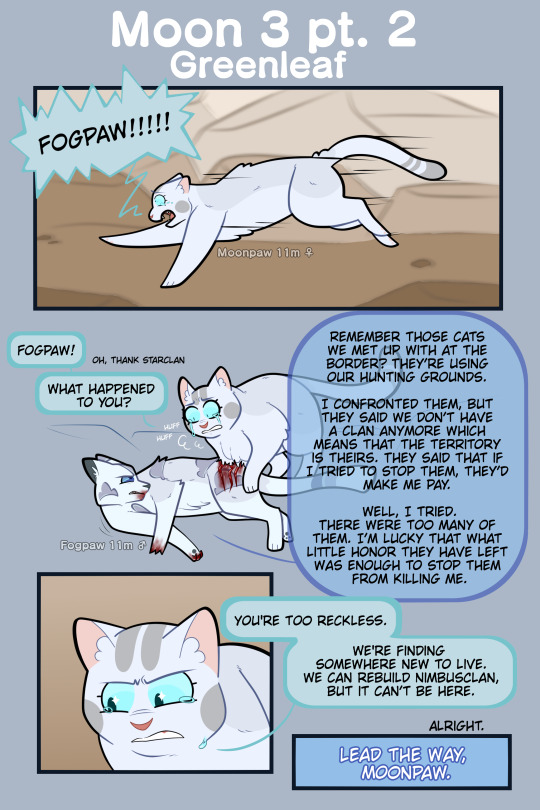
Without a second of hesitation, Moonpaw takes off over the mountain, mouth open to follow Fogpaw’s scent as her paws fly over the rocks. Her legs are screaming, but adrenaline overpowers her exhaustion.
“Fogpaw?” She yowls. “Fogpaw!”
“I’m here.” Fogpaw’s voice sounds from somewhere nearby, strained but blessedly alive. Moonpaw turns in the direction of the sound and darts around the edge of an outcropping of rock, freezing as the sour scent of blood fills her nostrils.
“Fogpaw?”
“I told you, I’m right here,” He hisses. He’s half on the ground, struggling to pull himself to his paws, so Moonpaw goes to press her body to his to help him up. His pale fur is stained and streaked with blood from long gashes that mar his flank and there are clumps of fur stuck between his claws.
“What happened to you?” Moonpaw is terrified. The scent of blood reminds her of her last night at home and she struggles not to gag. “It smells like other cats.”
“It was other cats,” he spits, leaning heavily on her as she guides them back towards where she first spotted the rabbit. He limps, wincing with each step. “Remember those cats we met up with at the border? They’re using our hunting grounds.” Fogpaw’s voice shakes with anger. “I confronted them, but they said we don’t have a clan anymore which means that the territory is theirs. They said that if I tried to stop them, they’d make me pay. Well,” he laughs humorlessly, “I tried, but there were too many of them. I’m lucky that what little honor they have left was enough to stop them from killing me.”
Thank StarClan. She can’t lose her brother, too. He’s the only thing she has left. “You’re too reckless,” Moonpaw scolds. Fogpaw’s muzzle twists into a scowl, but he doesn’t deny it. “We have to leave, Fogpaw. We need to find somewhere new. We can rebuild NimbusClan, but it can’t be here.”
He looks at her, his eyes going wide and round. Slowly, a determined sheen comes over them. “Alright. Lead the way, Moonpaw.”
[Previous] [Start] [Next]
#i never assigned a clan name to the border cats bc they never show up again after this and i didnt wanna falsify their importance#but trying to word dialogue without being able to say 'xClan' was more of a headache than i expected it would be#the cats. the cats for fogpaw. the cats chosen specifically to maim fogpaw. fogpaw's cats#PlotDeviceClan#clangen#warrior cats#waca#wc#moon 3#moonpaw#fogpaw#i didnt include the game text in this one bc it was already VERY text heavy but for anyone curious#this scene is 'fogpaw is attacked by 'rogues'' and 'fogpaw is being scolded for reckless behavior while training'#cw blood#cw injury
69 notes
·
View notes
Text

i drew another chimera sanji btw i thought yall would like to know maybe ill draw even more who knows
#hes like my son now just like the falsified zoros#one piece#one piece sanji#sanji#black leg sanji#op sanji#one piece fanart#dungeon meshi#dunmeshi#vinsmoke sanji#opfanart#op fanart#op#art#artwork#digital art#digitalart#chimera sanji
146 notes
·
View notes
Text

#donald trump just got convicted on all 34 felony accounts of falsifying business records#i havent been this happy since he got covid#🎉🎉🎉
145 notes
·
View notes
Text
sukugo where sukuna was in-love with a heian era six-eyes user.
they fought, he watched his partner cry for he had no tears to spill. it was the closest thing sukuna's ever had to an equal, but sukuna is still just a curse among humans
he eats his partner and carries the strength his dear lended him to their last breath with a heavy heart. he's faced others since then and his mind has pushed those memories aside like it would do for any other human and sukuna hates it
thousands of years later sukuna meets his reinarcanted lover now as satoru. satoru however doesn't see sukuna the same way, he doesn't have the same gentle words ( to sukuna atleast ) that ryomen's past lover would murmur endlessly. he's a tease, as if any possible higher diety has sent down the odd-acting man to mock the memory of his lover
sukuna starts to lose his mind over it and can't help but want to kill satoru regardless of how a great an opponent the man is. it's simply too much. then he sees how satoru is with his students, how much he tries and it hurts that he knows his past-lover was exactly like that
tldr; sukuna goes through an entire spiral and his mental takes a full on decline over dead-wife syndrome
#sukugo#satoru gojo#jujutsu kaisen#ryomen sukuna#honestly I think satoru wouldn't even care for sukuna in this au so sukuna is just chasing#something that's no longer there#'do I look like your girlfriend?'#satoru stop messing with that man you are evil mewie#On top of that I think the rare moments where sukuna is treated gently by satoru is falsified by sukuna's mental decline
56 notes
·
View notes
Text

source: crime and punishment: a falsified romance
22 notes
·
View notes
Note
🏥 for the ask game? i think it'd be funny (and kinda horrifying tbh) if she tried working at a hospital as one of her week-long stints
🏥 OC in a nurse uniform
those arent SCRUBS. GO CHANGE!!!!!!!!!!!!!!!!!


#who even knows HOW she got a job at a hospital (we do know (she lied (falsified documents and references(#AGAIN. ITS ALL ABOUT THE OUTFIT!!!!!! SHE JUST WANTED TO WEAR A FUN CUTE LITTLE OUTFIT!!!!!!!!!!!!#no but real talk she is not getting SHIT done in that hospital. she is squeamish as hell#kleoz dollhouse#kleomatsu#self insert#ocmatsu#doctor t reference. s3#ask!
45 notes
·
View notes